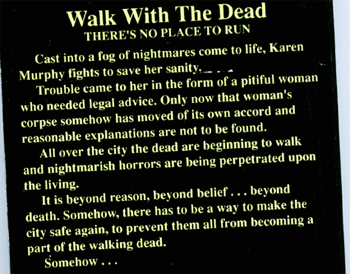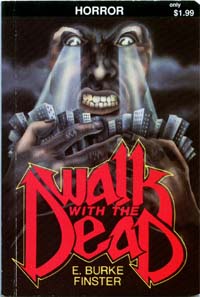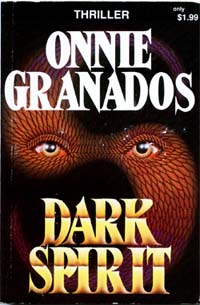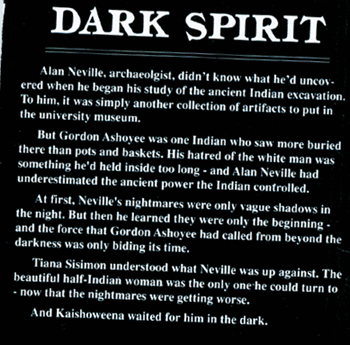![]()

Thus begins the classic novella Walk With The Dead,
which just so happens to have been written by Yours Truly. Really.
Pay no attention to the name on the dust jacket, he's a construct of my warped
imagination (plus the publisher wanted it to sound like there were more writers
on the payroll and ... more on this later).

As for what it's about ... read the back cover blurb ...
Scary, eh?
By the way, the picture of the front cover ... that's the book's actual size. I kid you not.
Walk With The Dead was the second book I wrote for a local (Portland, OR) publishing company, DimeNovels, back in 1990. The first book was Dark Spirit:

If the cover art looks remarkably like a Stephen King novel published at the
same time, I can only say that any resemblance is completely and utterly
coincidental. I swear. Besides, I had nothing to do
with the cover art ...
 although
this time I did write my own back-cover blurb ...
although
this time I did write my own back-cover blurb ...
So what happened to DimeNovels and/or my illustrious writing career? Got a few hours?
Briefly, DimeNovels was an attempt to revive (read: "cash in on") the late, great, occasionally lamented pulp fiction publications of the 1930's and 40's. I'm a huge fan myself, having a particular affinity for mysteries of the era (any Fredric Brown fans out there?), and I'm pretty sure I actually came up with the name "DimeNovels" for the company; I vaguely remember the original name as something like "Tiny Tales" or "Petite Press," your semi-alliterative naming convention that smacks of infantile imagination and major mediocrity, if I may be semi-alliterative myself. Not that DimeNovels is particularly inspired, but at least one can argue that it accurately described this author's salary. Ha ha.
I seem to remember I also suggested the name "Pulp Fiction," but got shot down. One day, Quentin Tarantino and I will share a big laugh over this.
DimeNovels was -- from my perspective -- the product of a (figurative) marriage between a moneyed father of no small talent, in fact a man of no talent whatsoever, and an editorial mother of great intelligence, thoughtfulness, kindness, warmth, and all that good stuff. As for their names ... well, as Bill Shakespeare once wrote, "What's in a name? And can I be sued for libel if I piss somebody off?"
Anyway, Mr. X came up with the money, somehow, to start a small press, and I mean small press -- as I said earlier, I kid you not about the physical size of the books DimeNovels was looking to publish. The idea was, small books take up small space with means more titles without more shelves so you end up (theoretically) with more money for less investment. Plus they looked cute. The idea was, stick a box of them near the checkout stand of your local supermarket, between the Tic-Tacs and the "Dress Your Cat Like 18th-Century Royalty" pamphlets, charge maybe a couple of bucks for each title, print ten new titles every month, and you're in business.
Ms. Y was in charge of doing all the editing and reading manuscript submissions, and she put an ad in some writer's publication about looking for writers for "an exciting new opportunity blah blah blah" and what the heck, they didn't ask for any money or for me to make a religious conversion or anything, so I sent them a story.
They sent back a letter saying something like, "Like your style, but the story ain't exactly what we're looking for, got something in the novella range, about 20,000 words?" I didn't, but I said, "Sure, just give me a couple of weeks!" and spent the next couple of weeks hashing out a 20,000 word story.
Useful note: In the old days before computers, which this was, standard submission size for writing intended for publication was 10 (pica) typewriter characters per inch, 25 lines per page, double-spaced, one side only please, which works out rather nicely at about 250 words per page, or 80 pages for 20,000 words. I don't know about you, but for me it's much easier to visualize 80 pages rather than 20,000 words.
For you literary types, 20,000 words is about the minimum length for a novella -- anything under 7,500 words is short-story territory; 7,500 - 20,000 words is the range of the novelette; 20,000 - 50,000 words is the aforementioned novella, and above 50,000 words is where you start hitting novel length. Novel length is open-ended but unless you're Stephen King or J.K. Rowling, anything past 110,000 words is a bit on the thick side for a lot of publishers, so prospective authors take note.
When I finished, I'd written a story I'd titled Happy Hunting Ground, which the editor, Ms. Y, loved, except for the title.
"'Happy Hunting Ground' sounds a bit ... well ... like a 'Cowboys and Indians' story, don't you think?" she said, to which I replied,
"Actually, I thought it was quite clever, with the symbolism linking the real world and the spirit world, coupled with subtle allusion to the plight of our protagonist and his nemesis, plus of course the ironic reference of 'happy' to 'hunting,' where blah blah blah sixty-nine-cent-words blah blah ..."
Obviously I didn't win this argument, and I can't remember if it was she or I or some line editor who came up with the title Dark Spirit (my brother-in-law came up with my personal favorite title, "Maggot Fest"), but somehow we all agreed on a title and the rest, as they say, is history.
As for my other book, Walk With The Dead -- the genesis was, another writer whose name I forgot about five seconds after reading his or her name, had submitted a manuscript for a "thriller" that involved some generic bad guy and some generic hero who was -- this is important for later -- a woman, and Ms. Y approached me and said, "We need a horror book for the collection, and this is one we're considering. It could use some editing, though, and I don't have time. Would you be interested? You'll need to use a pen name because we want to sound as if we have ten different authors. And we need it in two weeks."
So I read it, and my first reaction was, "I could eat a dictionary and puke a better story than this." No offense to the original author, of course.
My second reaction was, "You'll pay me how much to fix this and have it back to you in two weeks?"
I was under-employed at the time, doing part-time work for the U.S. Census, if memory serves, and not about to turn down any money making opportunities, of which this was most definitely one. I edited out the bad parts and spiced up the good parts, meaning I literally threw out everything the original author had done, with the smallest of exceptions -- I used a female protagonist. As for why, I just liked the idea. But (no pun intended) could I pull it off, being a guy?
I'll leave it up to the reader to decide.
DimeNovels lasted one printing, then ran off to Mexico or points south, something like that. Mr. X did the running; Ms. Y ended up unpaid for a great deal of her work, and the moral of the story is ... this would all make a great novel, about 100,000 words, and if you cut me a check for the advance I'll get started on it tomorrow and have it for you in two weeks.
My very first fiction sale (if you don't count my winning the Literary Lion writing contest twice in high school) was to Ellery Queen's Mystery Magazine (EQMM) in August, 1989.
How that came about: I was taking a creative writing class in 1989 at San Jose State (while majoring in "Radio/TV/Film," which is a whole 'nother story itself -- ask me about my screenplay sometime) from a guy named Craig Kee Strete, whom you may have heard of. Or not. He's a rather respected author, though he's not writing all that much anymore, and his stuff is sort of Harlan Ellison meets Sherman Alexie, if you can get a handle on that.
Anyway, he has more than a few connections in the publishing industry and one day I wrote a story for class (homework) that I shared with everybody (part of the requirement), and Craig said something like, "Hey, make a few nips and tucks here and there and I think you can sell this. I know some people."

So I made a few nips and tucks, Craig sent it off to Eleanor Sullivan (who was at that time editor of EQMM), she liked it, they paid me a few hundred bucks for it, and voila, there I was, a Writer.
If you'd like to read the story, click the magazine cover!